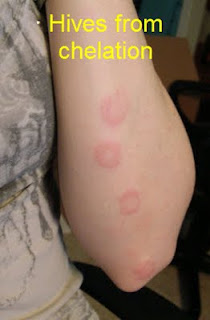
Hives or urticaria is a severe itchy, red rash that appears on a person’s skin. It is also known as nettle rash, welts, or hives. The medical name for hives, urticaria, is actually derived from the Greek word urta, which means "blood." It may be caused by something like an allergy or something more serious like a fungal infection, eczema, or even an insect bite. The word hives comes from the Latin words for "hurt"pus."
It may be hard to imagine why a simple allergy or rash will result in a hive’s flare-up. However, hives are caused by an allergic reaction to chemicals and food. Because of this, hives are often triggered by things such as detergents, shampoos, hair color, makeup, perfumes, perfume, and even clothing.
Many people experience hives each day. They can be very embarrassing and annoying to deal with. People who experience hives regularly may find them quite painful to handle.
Hives do not go away on their own, and they do not always go away. If the hives are left alone, they may spread and become more painful. In some cases, the hives may not clear up on their own, and the person may need to seek medical attention for relief.
People who have hives should seek medical help as soon as possible. Hives may be serious medical conditions and should be treated quickly so that they do not get worse. If the hives do not go away on their own and the person needs medical treatment, hives will be removed by a doctor using surgery.
If hives do not go away after medical treatment, the person may need to take a number of treatments until the hives subside. Some hives may be treated with over the counter meds, but more severe cases may require stronger medications.
If you have a history of hives and are experiencing them at the moment, see your doctor right away for medical help. You should get a prescription for OTC medications to avoid any future hives flare-ups.
Hives may be triggered by a number of factors including allergic reactions to foods, the environment, stress, and medications. Hives can also be triggered by some medicines. Although they are considered a common problem among people, only if they are a problem you are having, most people do not have an accurate idea of what causes hives.

Allergens can cause hives. Foods such as eggs, peanuts, milk, soy, wheat, and shellfish can cause allergic reactions in some people. Allergic reactions to these foods can be severe and life-threatening. It is best to avoid these foods and avoid them in the future.
Rash can also be caused by stress. Stress can cause excess saliva and mucus in the body. This can cause symptoms of hives.
A weakened immune system responds to stress by producing more mucus. This can cause the body to produce even more hives. Another type of stress that can cause hives is the stress of what is happening. If you have a difficult boss or spouse, this can increase the amount of stress in your life, which can lead to hives.
Another possible cause of hives is over-the-counter or prescription medications. Antihistamines, antibiotics, chemotherapy, blood pressure medications, antidepressants, steroids, antidepressants, and birth control pills can cause allergic reactions. These drugs can cause allergic mucus production and symptoms of hives. These drugs should be avoided.
Drugs and environmental toxins can trigger an immune system reaction. Some people are genetically predisposed to problems with the immune system. The use of certain antibiotics, especially an antibiotic called penicillin, can make them more vulnerable to this problem. This problem can be caused by prolonged and repeated use. People who develop hives when they take antibiotics usually develop it after long-term use.
If you have a history of hives and are experiencing it right now, contact your doctor immediately for medical advice and information at https://obatklg.co.id/. to prevent further complications. Your doctor may write you a prescription for over-the-counter drugs to relieve your symptoms and reduce your risk of infection.
Urticaria can cause all kinds of pain and discomfort, and sometimes it can cause serious health problems if left untreated. Be sure to discuss with your doctor any medical conditions you may have experienced recently to determine if they could be causing your hives.